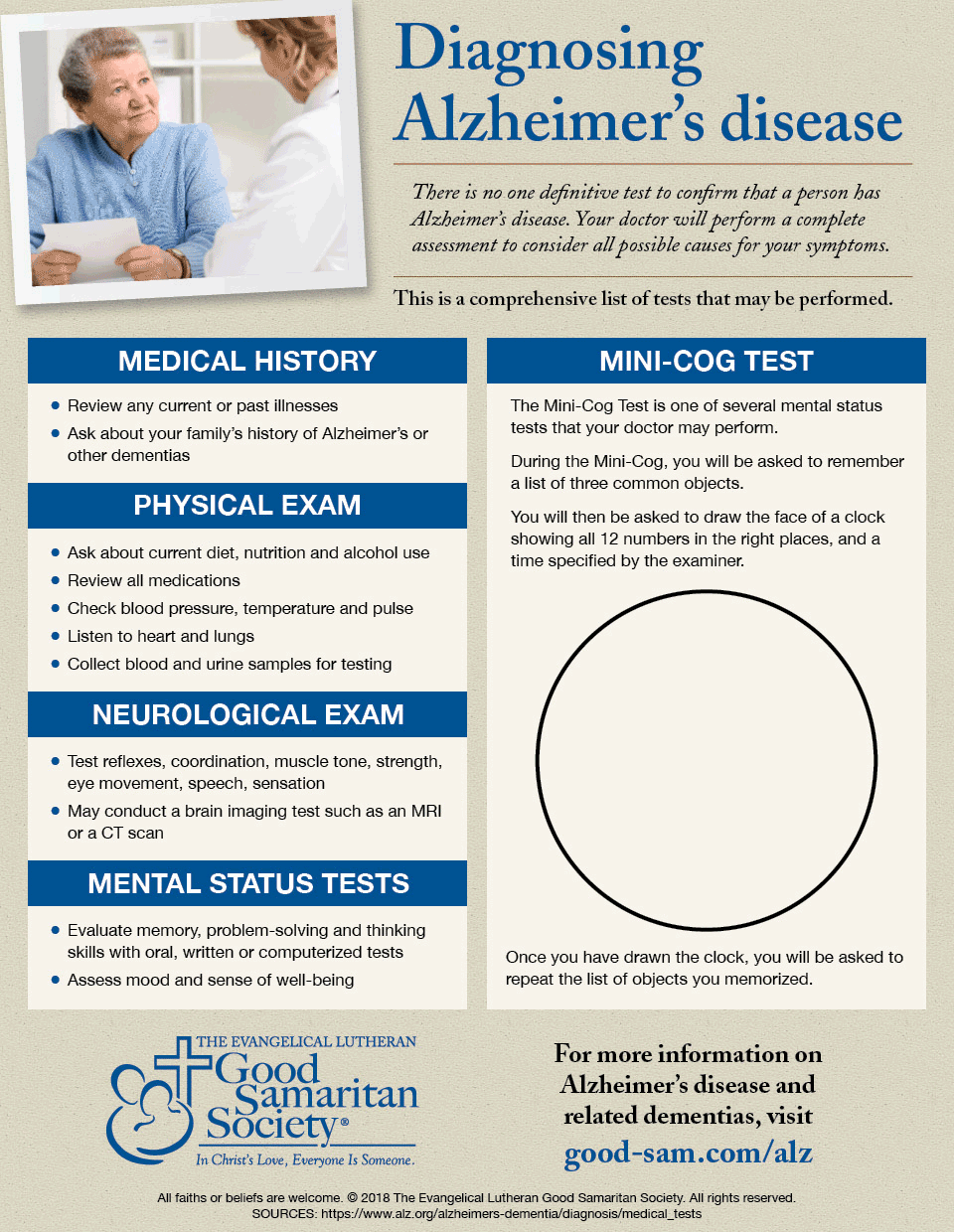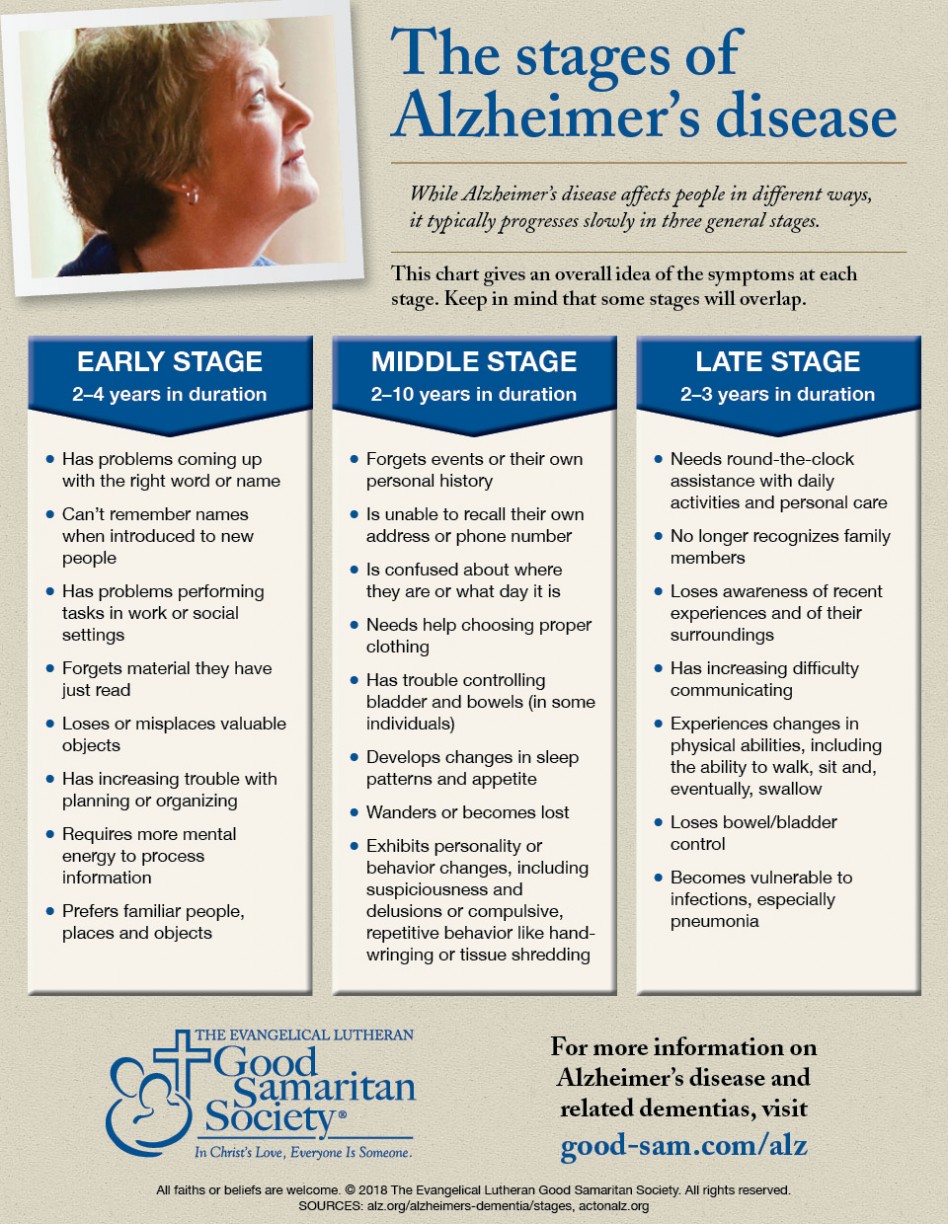The number of people living with Alzheimer’s disease — 5.7 million — is staggering. But those numbers are just the tip of the iceberg, the Good Samaritan Society reported in 2018.
By 2050, the number of Americans with Alzheimer’s disease or other dementia is expected to reach nearly 14 million and cost our nation $1.1 trillion.
Take our quiz: What do you know about Alzheimer’s disease?
With this disease touching so many lives, it’s important to have the basic facts.
What is Alzheimer’s disease?
Alzheimer’s disease is the most common form of dementia. This umbrella term describes a range of symptoms that include memory loss, personality changes and impaired reasoning.
Forms of dementia include:
- Alzheimer’s disease, which accounts for 50 to 75% of dementia cases.
- Vascular dementia, which accounts for 20 to 30% of dementia cases.
- Lewy body dementia, which accounts for 10 to 25% of dementia cases.
- Frontotemporal dementia, which accounts for 10 to 15% of dementia.
What are the signs and symptoms of Alzheimer’s?
Many symptoms might suggest Alzheimer’s disease, but the most common is difficulty remembering new information. Other signs and symptoms can include:
- Memory loss
- Confusion
- Repetition in conversations
- Changes in sleep and appetite
- Mood, personality and behavior changes
- Disorientation to time or place
- Poor judgment and problem solving
- Wandering, pacing or shadowing
- Deterioration of self-care
- Difficulty performing normal tasks
Many times, a person with these signs and symptoms won’t recognize the problem, while it may be obvious to friends and family. For someone showing signs of dementia, it’s important to see a doctor as soon as possible.
Find a doctor: Sanford Health specialists in treating older adults
Why is testing important?
Alzheimer’s is a frightening disease, and sometimes a person might want to ignore the warning signs. An early diagnosis has several benefits, including:
- Access to medications. Drugs will not prevent or reverse the disease, but they can reduce symptoms.
- The chance to make lifestyle changes. To preserve brain function, you can stop smoking or becoming more physically, mentally or socially active.
- The ability to maximize your quality of life. You can spend more time with loved ones or take a trip you’ve always dreamed about.
- The chance to plan for the future, including preparing an advance directive.
How is Alzheimer’s disease diagnosed?
Alzheimer’s disease is commonly under-diagnosed. If you suspect you may have it, request to be tested by your doctor.
Enlarge

Infographic by Kristy Anderson, Good Samaritan Society
Testing can sometimes take multiple visits to gather enough information. If possible, bring a friend or relative with you to these appointments.
I’ve been diagnosed with Alzheimer’s — what now?
A diagnosis of Alzheimer’s is life changing. But you don’t have to feel helpless. There are many steps you and your loved ones can take to ensure you have the best quality of life for as long as possible.
Take care of your emotional needs. You may feel anger, denial or a sense of loss. Writing these feelings down or sharing them with a friend, loved one or support group can help you cope.
Educate yourself. Learning more about the disease and ways to care for yourself and your loved ones at this time is empowering.
Care for your physical, mental and social well-being. Staying healthy in these areas can also help your cognitive functioning.
Plan for the future. Now is the time to talk with your loved ones about your future wishes, build a plan of care, and put in place advance directives such as a healthcare power of attorney and a living will.
Your loved ones will also be affected by your diagnosis, not only emotionally but also physically, mentally and financially as they support you.
What are the stages of Alzheimer’s disease?
Alzheimer’s is progressive and there is no known cure. A person lives an average of four to eight years after diagnosis, but can live as long as 20 years depending on the stage at diagnosis and other factors.
While Alzheimer’s is best known for affecting thinking and memory, it’s important to know that physical abilities are also deeply affected in the late stage of the disease. This will help with planning for future caregiving needs.

Infographic by Kristy Anderson, Good Samaritan Society
Where do I go for support?
Being diagnosed with Alzheimer’s can be scary, but remember you aren’t alone. There are many resources to help you navigate your future. The Alzheimer’s Association can connect you with phone support, local resources and support groups, education programs, and online tools.
More stories
- Alzheimer’s and dementia: What do you need to know?
- Can genetic testing provide answers about dementia?
- Nursing home leader: Innovators needed
…
Posted In Healthy Living, Senior Services
